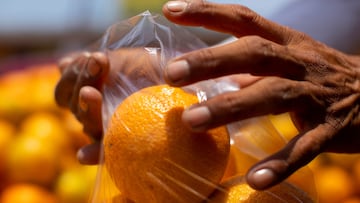Why are oranges and tangerines sold in a red mesh bag?
Have you ever noticed that oranges and other citrus fruits are often sold in a red mesh bag? This packaging is meant to entice customers to buy the fruit.

Fruits, like vegetables, make up an important part of a healthy diet. Well-known nutrition wisdom suggests that people eat five servings of fruit or vegetables a day. Oranges are common fruits that offer many health benefits and are easy to incorporate into one’s diet.
This popular fruit offers great benefits for the immune system and is rich in fiber and vitamin C. Oranges are also a common ingredient in various recipes.
When you buy these citrus fruits is some quantity from the grocery store, they often come packaged in a red mesh bag.
READ ALSO: This common fruit may be the secret to better sleep
Why use a red mesh bag for citrus fruits?
It is common to find both oranges and other citrus fruits, such as tangerines, sold in a red mesh bag. However, it’s not just a simple packaging choice, but rather a marketing strategy.
As with many things we can buy, the purpose of some aspects of a product is to attract the customer’s attention. In this case, the red mesh bag makes these fruits appear brighter.
READ ALSO: Don’t throw away the banana skin: do this instead
Whever I buy a bag of oranges in these red mesh bags, I worry tiny pieces of plastic will find their way into my food.
— Shantha R. Mohan, Ph.D., DTM (@ShanthaRMohan) May 20, 2024
Recent articles on microplastics such as https://t.co/q9uYEZipGu have heightened my worry. pic.twitter.com/qlkqPgNfJF
This phenomenon is known as the Munker or Munker-White optical illusion. Through the superimposition of colors, one stands out more than the other. In the case of the bag of oranges, the colors in front enhance the tones of the citrus fruits that come inside these red mesh bags.
Related stories
In essence, the effect takes place because “our acuity for shape is better than our acuity for color, which means that we perceive the shapes with more detail and the colors with less detail,” according to Live Science.
In the case of the oranges, while the outlines of the spheres would appear very clear, the color sort of bleeds over, or assimilates, to adjacent spaces. This means the color of the oranges gets pulled closer to the color of the mesh crossing over them in the foreground. This makes even pale, sick-looking fruit look more vibrant and enticing to the customer.


Complete your personal details to comment